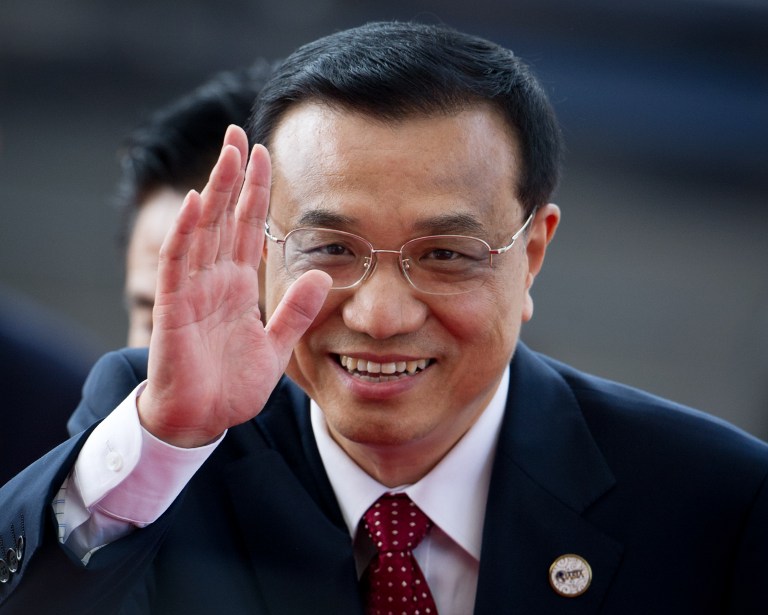SUMMARY
This is AI generated summarization, which may have errors. For context, always refer to the full article.

BEIJING, China – Li Keqiang stepped up to number two in China’s Communist hierarchy on Thursday, November 15, but despite his seniority and affable manner he may struggle to exert real power as the country’s next premier.
Vice Premier Li is expected to take over as premier from his boss Wen Jiabao in March, holding the reins of day-to-day government in the world’s second-largest economy.
His rise is said to have been brokered by President Hu Jintao as part of a behind-the-scenes deal to bolster the influence of the Communist Youth League, where both men made their name.
But despite his high rank on the Politburo Standing Committee, analysts say Li does not have a power base of his own — and risks being isolated.
A bureaucrat who speaks fluent English, Li, 57, has an easy smile and a more youthful bearing than his stiff party peers.
He has sought to nurture a reputation as a careful administrator and has voiced support for the kind of economic reforms many experts say China sorely needs — but questions remain on his efficacy.
As party boss in Henan province, Li took flak for the handling of an HIV/AIDS epidemic stemming from a tainted government-backed blood donation program. Entire villages were infected, but his provincial government responded with a clampdown on activists.
At the national level, a stream of health scandals have also happened on his watch.
“One concern with Li is that he has been dogged in the past with… not personal scandals, but policy embarrassments, particularly in Henan,” said Patrick Chovanec, a professor at Tsinghua University.
“The perception of him is he is not necessarily seen as the most effective policy-maker out there.”
The factional nature of the seven-man Politburo Standing Committee leaves him lacking “political heft”, he added.
Xi Jinping, who is expected to take over as president in March and is a “princeling” seen as closer to former leader Jiang Zemin, will need to be convinced on policy matters if Li is to exert influence, he said.
“In a sense they are actually rivals for the top position,” Chovanec added.
There are parallels with Li’s current superior Wen, who also struggled to force through policies as he battled with factions in the upper reaches of the party, and officialdom in the provinces and ministries, say analysts.
Similarly, Wen cultivated an image as the friendly face of the Communist Party, voicing qualified support for political reform, comforting disaster victims and condemning corruption — though a New York Times report last month said his relatives had amassed $2.7 billion in “hidden riches” since 1992.
Li, a native of eastern China’s poor Anhui province, worked as a manual laborer before gained a law degree from Peking University and a doctorate in rural economics, then rose through the ranks of the Youth League.
He became the party leader in Henan, in central China, and Liaoning province in the northeast, both of which prospered under him, before being promoted to Wen’s deputy.
As China’s second most important decision maker on the economy, Li has been praised for helping to steer the country through the global financial crisis relatively unscathed.
But a top priority for Li will be to boost China’s economic growth, which is currently export-led and sagging because of weak demand for manufactured goods in Europe and the United States.
Analysts say Li has been at the forefront of efforts to wean the country towards more balanced development, with domestic consumption playing a greater role.
Li is also said to be focused on developing a Chinese middle class while retaining an interest in the plight of the country’s less well off — a reputation derived from his modest background.
Public discontent over China’s unequal wealth distribution is a key concern for the authorities, who are anxious to avoid social unrest.
But some analysts say Li’s reputation as a standard bearer for the poor is not backed up by his previous actions.
“This issue has already resulted in trouble for the government, as there are a huge number of protests that occur in China on a day to day basis,” said Barry Sautman, a China analyst and associate professor of social science at the Hong Kong University of Science & Technology.
But there was “no indication” that Li and Xi “are any different from the current leaders in this respect”, he added.
“There is nothing they have done in the past to suggest they might do something different from what has been done over the course of the last 30 years or so, which is to make things even more unequal.” – Neil Connor, Agence France-Presse
Add a comment
How does this make you feel?
There are no comments yet. Add your comment to start the conversation.